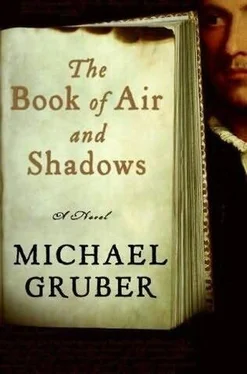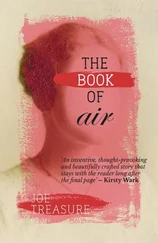drawes out from his presse the fayre copy, saying you shal burn this & I goe to do it drawing neare the flames but at last could not, I know not why, it was to me neare to killing a babe; for I loved him & saw he loved it much. But this I had not in my harte to say in wordes; instead I sayde upon second thought perhaps we should keep it safe as evidence of this vile plot. Now he looketh longe at the fyre, in scilence, drinkinge: then saies he, there is a thought my Dick, a happy thought. We will not burn her, nore uze her to stop draughts or start fyres, but she shal drowne; as who knowes what may rise from water in a comeing tyme when men may see these thynges with a new eie. Then he laughs & saies I trow that this poor unheard play will be all of Will that’s heard of an age from nowe & that a mere mocke. Nay, saies I, for the mob doth flock to thy plaies & it is oute of question thou’rt best for comedies. At this he doth pull a face as if he bit upon a rotten fish & he saies, Codso, how thou dost prattle, Dick. What’s a play! New a’ Tuesday & sennight later they cry have you not some-thynge else, we have hearde this before. Tis a penny-tuppence businesse withal, emplaced curiouslie betwixt the bawds and the bears, of no consequence a thynge of ayre and shadowes. Nay, if a man would live after his bones are in the earth he must make weightier stuff out of his braines, epic poesie or histories, or from his loines make sonnes. I have no histories & of epics onlie two, and those slight ones. Had I landes & wealth or learning I might have been another Sydney, a better Spenser, but from my youth I must earne, earne, & a pen can draw readie money only out of yon wooden O. And my son is dead.
We spake no more to our purpose that night. Later, wee left for Warwickeshire & a hard going we hadde, it being winter & all myres, but arrived in Stratford 18 thFebry & took us to a certayne place & hid safe the booke of that playe. Where it is have I writ down in a cypher knowne but to me and Mr W.S. It is not this cipher my lord, but a new one I have devized with Mr W.S. for he sayde hide what I have writ with my writing and wrote me out the key on the instant & this direction is kept by me all ways, and anie man who hath it & hath the key & hath the scille to uze my distance rule may find that place where it resteth.
My Lord, if you have need of this playe of Mary of Scotland but send word, as I aime to submit to youre desyres in everie thynge. I am yr. Lordship’s most humble & obdt. servt.
Richard Bracegirdle
London, 22 ndFebruarie 1611
We were expected at the prison, welcomed even, by the deputy warden herself, Mrs. (not Ms.) Caldwell, a dame of Thatcheresque dimension, polish, and accent. I wondered at the time how long prior to this visit Paul had arranged things. Did he foresee the need to visit prisoner Pascoe as soon as he learned about my involvement with Bulstrode and the various secreted manuscripts? Unlikely, but it would not entirely surprise me. As I noted, Paul is very smart, and subtle with it. His predecessors in the Society of Jesus used to run whole nations, so that outsmarting a bunch of Russian thugs, even Jewish ones, might not be a major challenge. Is that a logical statement? Perhaps not and perhaps also a little reverse anti-Semitism in there: Jews are smart, therefore tricky, got to watch yourself around them, jew still a verb in many parts of my nation, nor am I immune to the cozy embrace of casual anti-Semitism. Rather the opposite, in fact, as Paul has often pointed out.
The prison was a class D facility, which is what Her Majesty calls her minimum-security facilities or, as we might say, her country club joints. Springhill House had actually been a private home at one time and all in residence were, according to Mrs. Caldwell-Thatcher, rehabilitating themselves fit to be tied. And of course we could see Mr. Pascoe, a model prisoner. Take as long as you like.
Pascoe was a small, unattractive little man, carefully dressed in a blue silk shirt, a fawn lamb’s-wool sweater, tweed slacks, and polished slip-ons. His small monkey eyes shifted behind thick clear-rimmed eyeglasses and he wore his thin hair (dyed a deplorable shade of yellow) swept back to his collar. He spoke in what Brits call a posh accent and suffered from the sin of pride. It was Paul’s religious duty to point this out and offer the opportunity for repentance; I’m sorry to say he did not, but exploited it, for our advantage. Or for the greater good, depending on one’s point of view. As I say, a subtle fellow, my brother.
We met in Pascoe’s room, a comfortable nest that could have been in one of those cozy-shabby hotels the English seem to like. The furniture was dorm-room institutional, but Pascoe had tarted it up with framed pictures and manuscript reproductions, an art deco bedspread, colorful throw pillows on his bed, and a worn Oriental carpet, perhaps genuine. He reclined on a pile of these pillows while we sat upon straight chairs. He made tea for us, fussing.
We began by discussing old Bulstrode. Pascoe had heard of his death and was avid for more information, which we supplied, although we did not deny the police theory that he had fallen prey to rough sex. Then there was some business I didn’t then understand about “was the payment through” and Paul said it was and handed him a slip of paper, which he examined, folded, and put away. After this he leaned back in his cushions like a pasha, folded his long delicate hands, and looked dreamily up at the acoustic tiles.
And proceeded to tell us exactly how he brought off the scam: that is, he told us that the Bracegirdle manuscript was a forgery (here he included copious detail about the source of the paper, the recipe for the ink, how to fake or subvert dating technology, etc.) and that someone, who he did not name, had contacted him, given him the text, and provided him with the appropriate materials. In prison? I asked. A piece of cake, Father. I could run ten-pound notes off in this rest home and no one would be the wiser. He’d done the job and smuggled the pages out and payment had been received. He’d also advised his mystery client about how to run the scam. The important thing was to string it out, make the mark work a bit, so that he thought he’d found it himself. So your first hint had to be produced into evidence as coming from an old book or books before a naive witness through legerdemain; and afterward bring in Bulstrode, the expert.
Why Bulstrode? Pascoe laughed nastily at this: once bitten twice shy is a load of bollocks, my son. Your best mark is a man who wants to recoup his loss-the poor bastards never learn. Prompted by Paul’s questions, he described just how he generated the supposed ciphered letters (nothing more intriguing than a cipher, gentlemen, as I said, you want to give the marks something to do), including the “discovery” of the indispensable grille, and then, almost smacking his lips, he laid out how to arrange the finding of the long-hidden treasure. He went into a lot of detail, which I will not repeat here, but it was highly convincing, and amazingly intricate. The forger’s agent within the camp of the mark-for this too was vital, and it had better be a bird, a little crumpet never hurts if the mark gets iffy-this girl would contrive to deliver the Shakespeare manuscript into the hands of the mark. Who would then sell it to the real mark, the moron with the money. Because, needless to say, you could only pull off something like this with illiterates. You couldn’t actually forge a Shakespeare play-the merest junior don would catch you out-so you had to find someone with more gelt than sense, d’you see, and then there had to be a secret transfer, the manuscript for cash, and goodbye. The final act was the girl swiping the cash from the original patsy-a trivial operation-and there you have it.
Читать дальше












